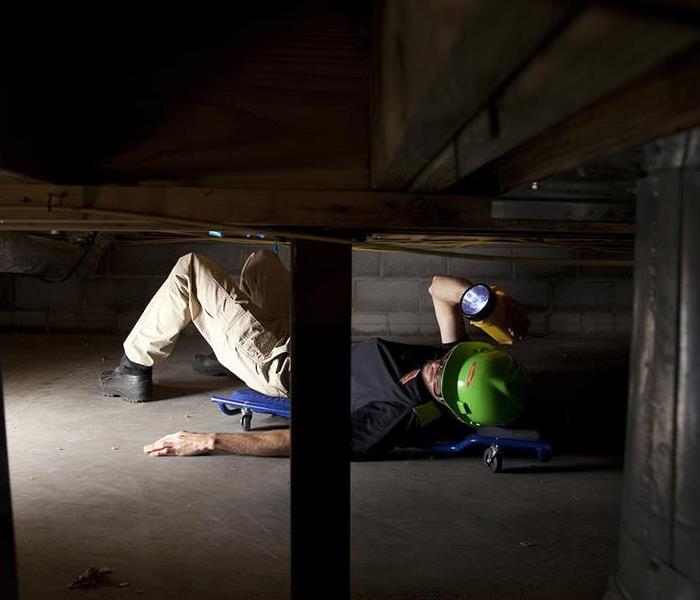Local SERVPRO Highlights the Seriousness of a Sewage Spill
4/13/2020 (Permalink)
Summary: SERVPRO of West Fort Worth stresses the importance of hiring professional water damage restoration specialists to deal with a sewage spill.
Sewage spills and toilet overflows are hazardous and should be considered emergency situations. The bacteria in sewage can cause serious illness and should be cleaned up immediately. This scenario illustrates the seriousness of the situation and the many factors that come into play when dealing with a hazardous spill, especially one in a high-traffic facility.
Case Study: Mess in the Mission
The basement of the old church fellowship hall was converted into a ministry that provided clothing, household goods, food, and toys to families in the church and the community. The sharing project was clean, well-organized, and very inviting until the catastrophe struck. There had been some warning signs in the past, and minor sewage backups had occurred occasionally. The building originally was a home, but the septic system had met code requirements. Still, a blockage coupled with a high-traffic weekend resulted in the basement filling with an inch or more of liquid and sludge. The church members decided to clean it up as much as possible.
The decision to tackle the mess without expert help was a big mistake for the following reasons. The sewage covered most of the basement, and it was impossible to assess the full extent of the damage without walking in sewage, which was a couple of inches deep. Every time a toilet was flushed, more sewage backed up. Unavoidably, raw sewage was tracked throughout the multi-building facility. The entire facility, every building, eventually had to have the carpet cleaned, sanitized, and deodorized. As a safety precaution, every surface was wiped with sanitizer to avoid the potential spread of E. coli bacteria, especially in the nursery and toddler areas.
In the basement, anything that was on the floor had to be either cleaned or discarded. Clothes, shoes, toys, appliances, non-perishable food items, and lots of books were bagged up and hauled off. The sewage was shoveled up and hauled out in buckets. The furniture, clothing racks, and shelving in the basement had to be wiped down many times during the cleanup process. Since the septic tank could not be pumped out for a day or two, more sewage seeped into the basement. After three days, the leadership decided to call in a professional cleanup team. The septic backflow had been remedied. The trained, experienced, and well-equipped crew quarantined the building, set up safety barriers and warning signs, and got to work. The team suited up with protective clothing, rubber boots, rubber gloves, respirators, protective eyewear, and more. They brought in the necessary equipment to get the job done swiftly and safely. When they finished, it was impossible to tell that there had been a major black water incident in the basement.
In any situation involving water, people should take basic precautions such as staying calm, avoiding any electrical hazards, avoiding slip and fall hazards, and using a flashlight in dark or dimly lit areas. Here are 6 other safety tips to take away from the sewage spill scenario above.
- Identify and resolve any sewage backup issues before they arise, as it will save money in the long term. These are three types of water: clean water, gray water, and black water. Clean water comes from a broken water pipe, a leaking faucet, or a sprinkler system. Gray water comes from a washing machine, a dishwasher, or a toilet with only a minimal amount of urine but no fecal matter. Gray water can quickly become black water if not treated soon. Black water contains fecal matter and harmful bacteria. It can cause illness if it finds its way into the body through the eyes, mouth, or a cut.
- Establish guidelines and protocols for hazardous events such as a sewage or chemical spill.
- Maintain a well-stocked safety kit consisting of protective footwear or booties, protective eyewear, a respirator or masks, rubber gloves, heavy-duty garbage bags, disinfectant, disinfectant wipes, several LED flashlights, and a basic first aid kit.
- Should an overflow or spill occur, avoid tracking black water throughout the facility. Avoid walking on exterior sidewalks or walkways with contaminated footwear. The fecal matter could still be tracked by others into the building or into their homes.
- Once an area is contaminated, put up safety barriers and signage to redirect foot traffic.
- Immediately call in a trained, experienced, and well-equipped cleanup team to do the job quickly, thoroughly, and safely so the facility can be up and running as soon as possible.
Water contaminated with sewage backup should be considered an emergency and should be dealt with as quickly as possible. The skilled professionals at SERVPRO of West Fort Worth are available 24 hours a day, 365 days a year. They are water damage restoration specialists with specialized training, equipment, and protective gear to safely restore a home or business contaminated from a black water overflow from a toilet, septic tank, or sewer line. SERVPRO of West Fort Worth can be reached by phone at (817) 560-3086.






 24/7 Emergency Service
24/7 Emergency Service
